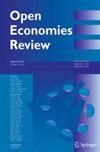金融发展与增长的趋同
IF 1
4区 经济学
Q2 ECONOMICS
引用次数: 0
摘要
我们评估了金融发展的跨国趋同性及其与国内生产总值增长的关系。金融包容性变量在各国间广泛趋同,金融覆盖率低的国家的赶超效应是趋同的主要推动力。相比之下,尽管 GDP 和金融包容性绝对趋同,但自 1985 年以来,包括国内信贷、负债、共同基金规模和股票市值在内的金融发展指标却出现了分化。GDP 增长率与金融发展的变化密切相关,但与金融包容性的提高无关。本文章由计算机程序翻译,如有差异,请以英文原文为准。

Convergence in Financial Development and Growth
We evaluate the cross-country convergence of financial development and its relationship with GDP growth. Financial inclusion variables have been widely converged across countries, and the catch-up effect of countries with poor financial coverage mainly drives the convergence. In contrast, financial development measures — including domestic credit, liability, mutual fund size, and stock market capitalization — have diverged since 1985 despite the absolute convergence in GDP and financial inclusion. The GDP growth rates strongly correlate with the change in financial development but not the improvement in financial inclusion.
求助全文
通过发布文献求助,成功后即可免费获取论文全文。
去求助
来源期刊

Open Economies Review
ECONOMICS-
CiteScore
2.30
自引率
16.70%
发文量
40
期刊介绍:
The topics covered in Open Economies Review include, but are not limited to, models and applications of (1) trade flows, (2) commercial policy, (3) adjustment mechanism to external imbalances, (4) exchange rate movements, (5) alternative monetary regimes, (6) real and financial integration, (7) monetary union, (8) economic development and (9) external debt. Open Economies Review welcomes original manuscripts, both theoretical and empirical, dealing with international economic issues or national economic issues that have transnational relevance. Furthermore, Open Economies Review solicits contributions bearing on specific events on important branches of the literature. Open Economies Review is open to any and all contributions, without preferences for any particular viewpoint or school of thought. Open Economies Review encourages interdisciplinary communication and interaction among researchers in the vast area of international and transnational economics. Authors will be expected to meet the scientific standards prevailing in their respective fields, and empirical findings must be reproducible. Regardless of degree of complexity and specificity, authors are expected to write an introduction, setting forth the nature of their research and the significance of their findings, in a manner accessible to researchers in other disciplines. Officially cited as: Open Econ Rev
 求助内容:
求助内容: 应助结果提醒方式:
应助结果提醒方式:


